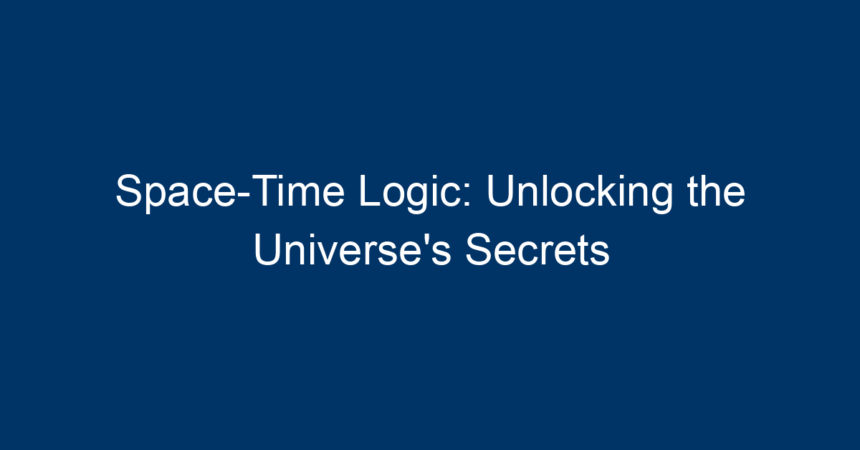The universe is an intricate tapestry woven together by the threads of space and time. How these elements interact is at the heart of some of the most profound questions humanity has ever posed. Enter space-time logic, a groundbreaking framework that seeks to unravel the mysteries of the cosmos and redefine our understanding of reality. In this article, we will explore the principles of space-time logic, its implications for modern physics, and how it offers a new lens through which we can view the universe.
Understanding Space-Time Logic
What is Space-Time Logic?
At its core, space-time logic refers to a systematic approach to understanding events as they relate to both spatial and temporal dimensions. Unlike classical logic, which operates primarily on the principles of true and false, space-time logic accounts for the complexity of events that occur over time and in various locations. It operates on the premise that the characteristics of an event are often influenced by when and where they occur.
This conceptual framework not only helps in grasping advanced theories in physics, but it also fosters insights into philosophical inquiries regarding free will, causality, and existence.
The Foundations of Space-Time Logic
To fully grasp space-time logic, it’s essential to dive into the foundational theories that paved the way for this innovative approach. Key figures in this field include:
- Albert Einstein: His theories of relativity introduced the idea that space and time are interwoven into a single continuum.
- Niels Bohr and Quantum Mechanics: Bohr’s work highlighted the role of observables in quantum systems, pointing to the necessity for a new form of logic when discussing phenomena on microscopic scales.
These foundational theories underscore the importance of perspective and relativity in understanding cosmic phenomena.
The Intersection of Space-Time Logic and Modern Physics
Time as a Dimension
In traditional physics, time is often viewed linearly—a simple series of cause and effect. However, space-time logic posits that time should be treated as a dimension comparable to space dimensions. This perspective allows for a more nuanced understanding of how events interact.
For instance, consider two events, A and B. According to classical observations, if A occurs before B, A might be seen as the cause of B. However, in a space-time framework, we can analyze how the relative positions of these events in a four-dimensional space can influence their characteristics and outcomes. This understanding not only enriches our grasp of causality but also forces us to reconsider definitions of causality in a universe where faster-than-light communication and quantum entanglement challenge our preconceptions.
Quantum Entanglement and Non-Locality
One of the most astonishing implications of quantum mechanics is the phenomenon of entanglement. In a nutshell, entangled particles appear to be linked regardless of the distance separating them. Space-time logic helps to articulate this concept by suggesting that the relationship between entangled particles transcends conventional notions of space and time.
By applying space-time logic, scientists can better analyze how these entangled states manifest and interact, providing a richer framework for understanding phenomena that seem to defy traditional limits of distance and temporal sequence.
Philosophical Implications of Space-Time Logic
Re-evaluating Causality
The journey through space-time logic ushers in profound philosophical inquiries about causality. With our new understanding that space and time are interconnected, the linear, deterministic view of causality becomes less tenable. Events may not follow one another in a clear, unambiguous causative manner.
This realization breeds a more sophisticated consideration of concepts like free will. If our decisions are temporally and spatially contingent—shaped by our location and timing—what does that mean for the idea of agency? Space-time logic encourages us to engage with these questions actively and seek a deeper understanding.
The Cosmological Perspective
Moreover, from a cosmological perspective, space-time logic prompts inquiries into the very structure of the universe itself. What if our universe is but one of many realities coexisting in a broader multiverse scenario? Space-time logic allows physicists and philosophers alike to conceive of the multiverse in ways that consider different dimensions of time and space, fostering hypotheses that challenge our understanding of existence as we know it.
The Application of Space-Time Logic in Technology
Advancements in Technology
The implications of space-time logic extend far beyond theoretical physics; they also manifest in technology. Consider how GPS systems utilize relativistic principles to function accurately. They account for the effects of time dilation—an insight derived from embracing space-time logic.
Moreover, emerging technologies in quantum computing harness principles rooted in space-time logic. As researchers develop more sophisticated systems, we will undoubtedly witness richer interactions between quantum mechanics and space-time analysis, opening new frontiers for innovation.
A Framework for the Future
As artificial intelligence and machine learning evolve, a space-time logic framework can enhance data analytics and predictive modeling. By operating within a space-time context, AI systems could venture beyond conventional algorithms, offering solutions to complex problems that require a multi-dimensional approach.
Actionable Insights: Exploring Space-Time Logic in Everyday Life
Cultivating a Multi-Dimensional Mindset
For individuals interested in exploring the vast potential of space-time logic, here are some actionable steps:
-
Engage with Science: Read books and articles focused on modern physics and cosmology to develop a foundational understanding of concepts like relativity and quantum mechanics.
-
Philosophical Inquiry: Embrace philosophical questions. Consider your beliefs about free will and causality—how have they been shaped by your experiences in space and time?
- Embrace Complexity: In decision-making, consider not only the immediate consequences but also the broader context—factor in how various elements might interact over time and space.
Continued Learning and Collaboration
To fully unlock the secrets of the universe through space-time logic, continuous education is key. Participate in discussions, lectures, or workshops related to physics, philosophy, and technology. Engaging with like-minded individuals can enrich your understanding and spark new insights, facilitating a journey through the intricacies of the cosmos.
Conclusion
Space-time logic serves as a powerful lens through which we can interpret the universe’s complexities. By weaving together the principles of space and time, it invites us to rethink our understanding of reality, causality, and our place within the grand scheme of existence. As we endeavor to unravel the universe’s secrets, embracing space-time logic may lead us to new realms of knowledge, discovery, and innovation. By exploring these dimensions, we are not only expanding our intellectual horizons but also unlocking the infinite possibilities that lie ahead.




